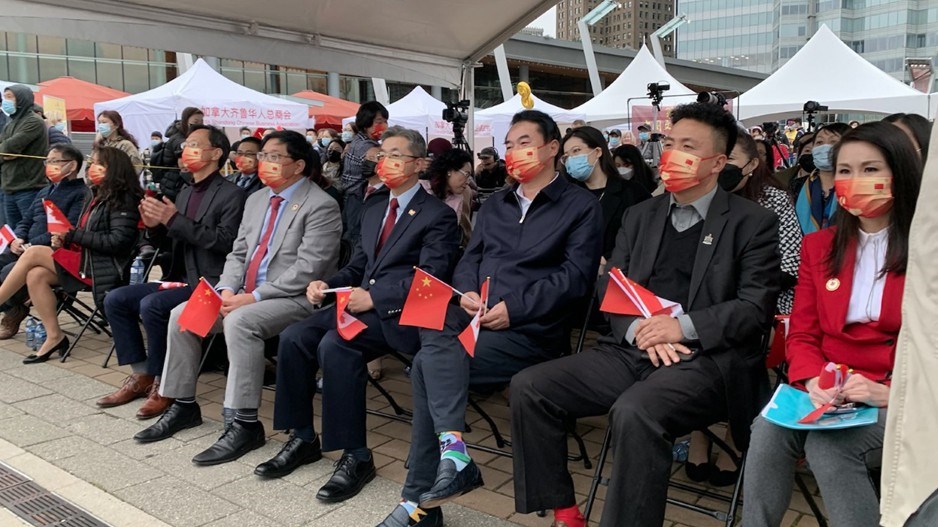On the heels of Canadians Michael Spavor and Michael Kovrig being released from a Chinese prison, Huawei Canada sponsored a Chinese government-linked cultural event in Vancouver Saturday, with B.C. politicians in attendance waving both Canadian and Chinese flags.
Meanwhile, on the same day, the burning of a Chinese flag by pro-democracy and Tibetan and Uyghur activists highlighted a protest at China’s consul general compound on Granville Street.
The cultural event was the third Chinese Cultural And Arts Festival hosted at Jack Poole Plaza by the Canadian Alliance of Chinese Associations. Among those attending were Liberal-appointed independent Senator Yuen Pau Woo, B.C. Minister of State for Trade George Chow, Burnaby councillor James Wang, Richmond councillors Alexa Loo and Chak Au, and Vancouver mayoral candidate Ken Sim.
The event was one of many Chinese cultural events tied to China’s consul general in Vancouver last weekend, in conjunction with celebrations for the National Day of the People’s Republic of China, also known as the Golden Week Holiday.
The event featured dragon dancing and promoted the upcoming 2022 Winter Olympic Games in Beijing, which are mired in an international boycott to draw attention to China’s human rights abuses – a campaign that has majority support among polled Canadians.
Chow also attended a Chinatown event with Consul General Tong Xiaoling, to commemorate the Chinese Communist Party’s postwar ascent to power, as well as the 110th anniversary of the 1911 Revolution.
Such events, often known as “soft diplomacy,” had been common practice prior to the coronavirus pandemic but had become rare with gathering restrictions coupled with greater tensions between Canada and China, particularly due to the detention of Spavor and Kovrig immediately following the December 2018 arrest of Huawei CFO Meng Wanzhou in Vancouver on fraud charges in the United States.
This one was the first public event sponsored by Huawei Canada, following the release of Meng from her extradition process (and subsequent release of Kovrig and Spavor).
Overarching questions following the extradition process include whether Canada will now ban Huawei from its telecommunications networks, on grounds of cybersecurity and Chinese state-led espionage, as have all of its national security allies, and whether the country will continue to forge ahead with more extensive trade ties with Beijing. China is interested in establishing Huawei overseas and has a large appetite for Canadian resources and energy. However, questions persist on whether Canadians want to do business with the authoritarian regime.
The Liberals maintained power in a minority government with a platform silent on such matters. With a platform much more critical of China, the Conservatives lost their bid to take control in Ottawa and may have lost seats in ridings with large Chinese populations due to perceived Chinese government interference.
Chow was not immediately available for comment. It’s unclear whether his attendance is an indication that the BC NDP provincial government is set to encourage trade ties with China. Minister of Jobs, Economic Recovery and Innovation Ravi Kahlon oversees Chow’s ministerial post. This summer, when asked if his government intended to strengthen trade ties with China or diversify, Kahlon affirmed the latter.
Despite the persistent tension, Canadian exports to China rose in 2020 to $24.5 billion – up from $22.4 billion in 2019; those 2020 exports to China far exceeded all previous years on record other than 2018 ($26.8 billion). B.C. accounted for $5.7 billion of the 2020 exports, which was the lowest total for the province since 2016, when the BC Liberal government signed the province up to China’s controversial Belt and Road Initiative.
Chinese-Canadian businessmen lead the Canadian Alliance of Chinese Associations. The alliance states online it aims to promote “unity and cooperation between Chinese communities” while participating in select philanthropic efforts such as disaster relief.
While it has claimed to be apolitical, it also claims to “actively participate in various activities of the Overseas Chinese Affairs Office and the Chinese Overseas Chinese Federation,” which are Chinese government-affiliated entities, identified as parts of the CCP’s United Front Work Department. Among its stated goals in Canada is to promote Chinese sovereignty in the South China Sea.
Also on Saturday, activists co-organized by the group Vancouver Society in Support of Democratic Movement gathered outside China’s consul general to raise more awareness for China’s treatment of Uygur Muslims in East Turkistan (Xinjiang Autonomous Region), which the House of Commons has labelled as genocide; dismantling of Hong Kong’s democratic system; and sustained intrusions on Tibetan culture.
The group also brought attention to what it claims are 150 Canadians still detained in China for political reasons, including Huseyn Celil, jailed for more than a decade on terrorism charges related to his Uyghur advocacy, and Sun Qian, a Canadian citizen and Falun Gong practitioner, who was arrested in Beijing in 2017.
“We request the Canadian government put pressure on China for the release of these political prisoners,” stated the group online, in a condemnation of “hostage diplomacy.”
Following the release of the two Michaels and Meng, it was the unelected Senator Woo who shared an op-ed on Twitter September 25 deeming Meng as a “hostage” of Canada. Such a view drew scorn from many, most notably former Conservative immigration minister Chris Alexander, who tweeted: “Mouthpieces for foreign propaganda, including those backed by China’s United Front Work Department, should have no place in Canada’s parliament.”
Woo responded publicly by saying he was a victim of racism due to Alexander’s comments. On Monday Alexander condemned the racism but stood by his words, the Canadian Press reported.




